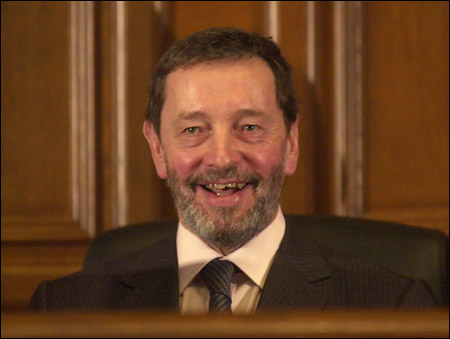Balancing human rights and security
British Home Secretary Blunkett addresses Law School audience

U.S. and British officials must strike the proper balance between anti-terrorist security and human rights now, because a failure that leads to another devastating attack will prompt even more draconian measures, British Home Secretary David Blunkett said Monday (March 8).
Blunkett’s hour-long talk, “Human Rights and the Terrorist Threat,” was sponsored by the University Committee on Human Rights Studies and by the John F. Kennedy School of Government’s Carr Center for Human Rights Policy.
Blunkett was introduced by Committee on Human Rights Studies Executive Director Jacqueline Bhabha. Bhabha said the talk is part of a yearlong series of lectures on human rights and terrorism that examines the trade-offs between rights and security. The series, Bhabha said, focuses on how those trade-offs are made and whether one group pays the cost of those trade-offs more than others.
In introductory remarks, James Barr Ames Professor of Law Philip B. Heymann said that the anti-terrorist policies that have generated a lot of heat for Blunkett in Britain are relatively mild compared with the policies instituted here in the United States.
While the Bush administration has detained more than 1,000 people with no judicial review, in Britain only 14 were detained under similar security laws, though those cases were subject to review and one was overturned.
“You would be a hero of the liberal cause here, Mr. Secretary,” Heymann said.
Blunkett said today’s security challenges are different from those in the past in that the terrorists operate in a diffused worldwide network that is driven by hate. The terrorists can’t be negotiated with, they’re difficult to engage militarily, and, in some cases, are impossible to prosecute.
“How do you punish a suicide bomber?” Blunkett asked.
That leaves prevention of terrorist acts as the major means of dealing with the threat they pose. Though there have been no major terrorist attacks in the United States or in Britain since 9/11, Blunkett said the terrorist networks have been very active, though since 9/11 the majority of their victims, in bombings such as those that took place in Bali and in Istanbul, have been Muslims.
Blunkett said today’s leaders really have no choice but to get the balance between human rights and freedoms and terrorist security right. Because, he warned, to restrict human rights excessively would hurt the freedoms on which our societies are based. On the other hand, Blunkett said, to ignore the terrorist threat or act ineffectively would result in attacks that would promote an even harsher crackdown.
The times are similar to those faced by Abraham Lincoln during the Civil War, Blunkett said. He referred to a quotation by Abraham Lincoln in a letter to a group of Albany Democrats, after Lincoln suspended the writ of habeas corpus in 1863: “The time is likely to come when I’m blamed for making too few arrests rather than too many.”
The time to debate and implement such measures, Blunkett said, is now “in the cool light of day” rather than in the emotional time after an attack.
“I think it’s not just a legal, but a substantial political challenge to get these things right,” Blunkett said.
Blunkett defended the measures taken in Britain, saying that though they allow people to be detained, their arrests are subject to judicial review.
“The fact it is open to challenge, I believe, verifies that the process is fair and open,” Blunkett said.
Addressing the roots of the problem is also important. Poverty, hopelessness, and a feeling of being exploited by the West all contribute to the anger that fuels international terrorism. Blunkett said the challenge is to aid international partners such as Pakistan, while ensuring that pressure from the West doesn’t lead to measures that make the lives of ordinary people in those nations more difficult, as that would exacerbate the problem.
“We can’t just deal with terror without dealing with injustice,” Blunkett said.
Blunkett touched briefly on the debate about Iraq, saying he was aware of the “deep divide” over British and U.S. actions in Iraq. Blunkett described Hussein as “a megalomaniac who led us to believe, in everything he said and did, that he had weapons of mass destruction.”
An area that still needs to be addressed by anti-terrorism laws, Blunkett said, is how to deal with people who support terrorism passively.
“I think we have to be able to go after those who are supporters of terror without being centrally involved in terrorist activity,” Blunkett said.
Blunkett described talking with U.S. Secretary of Homeland Security Tom Ridge after Christmas, when several flights from Britain to the United States were canceled as a precaution. He said the incident illustrated the difficult judgment calls that he has to make every day.
“No politician would be forgiven if incaution had led to disaster,” Blunkett said.




